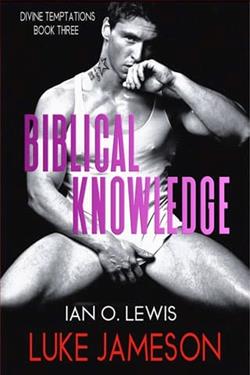
Biblical Knowledge
by Ian O. Lewis
He’s pure temptation—and I’m about to make him my religion.
Noah Miller is a brilliant biblical scholar with the kind of body that could make a priest break his vows. By day, he buries himself in dusty manuscripts. By night, he bares everything as “Solomon,” the stripper men pay to worship. His rule is simple—keep the sacred and the sinful in separate worlds.
Henry Forrester is temptation in human form—devout, disciplined, and so untouched it hurts. He’s the good Catholic boy who should be completely off-limits… but Noah’s never been good at resisting what he wants.
When they’re forced to work together, sparks turn into fire. Heated debates turn into stolen touches. And soon, Noah’s whispering filthy promises that have Henry falling to his knees for something far more dangerous than prayer.
Henry’s spent his life denying his hunger. Noah’s ready to feed it. And once they taste each other, there’s no going back.
Forbidden desire meets red-hot redemption in this sinful tale of faith, lust, and learning to love yourself in every way that counts. This 29k word novella can be consumed faster than a Sunday sermon, and it’s way more fun.
.
Read
Biblical Knowledge on http://kissnovel.net
Martial Peak Reviews
Ian O. Lewis's novella, Biblical Knowledge, is a provocative exploration of the intersection between faith, desire, and self-acceptance. This 29,000-word narrative is a compelling blend of intellectual discourse and steamy romance, offering readers a unique experience that is both thought-provoking and intensely passionate.
At the heart of the story are two contrasting yet complementary characters: Noah Miller and Henry Forrester. Noah is a character of duality, embodying both the sacred and the profane. By day, he is a dedicated biblical scholar, immersed in the world of ancient texts and theological debates. By night, he transforms into "Solomon," a stripper who captivates his audience with his physical allure. This duality is not just a plot device but a profound commentary on the complexities of human nature. Noah's ability to compartmentalize his life speaks to the universal struggle of reconciling different facets of one's identity.
Henry Forrester, on the other hand, is the epitome of restraint and discipline. A devout Catholic, Henry has spent his life adhering to the tenets of his faith, suppressing his desires in the process. His character is a study in contrasts to Noah's, and it is this very contrast that fuels the narrative's tension and intrigue. Henry's journey from denial to acceptance is both poignant and relatable, as it mirrors the internal conflicts many face when grappling with their true selves.
The chemistry between Noah and Henry is electric, and Lewis masterfully captures the intensity of their attraction. Their relationship is a slow burn, evolving from heated debates and intellectual sparring to moments of vulnerability and passion. The transformation of their dynamic from professional to personal is handled with nuance and care, making their eventual union feel both inevitable and deeply satisfying.
One of the novella's most compelling themes is the exploration of forbidden desire and the redemptive power of love. Lewis delves into the idea that true faith and self-acceptance are not mutually exclusive but can coexist harmoniously. Through Noah and Henry's relationship, the narrative challenges traditional notions of morality and piety, suggesting that love, in all its forms, is a divine experience.
Moreover, the novella does not shy away from addressing the complexities of religious doctrine and personal belief. The intellectual debates between Noah and Henry are not only engaging but also serve as a vehicle for exploring broader questions about faith, identity, and the human condition. These discussions add depth to the narrative, elevating it beyond a simple romance to a thoughtful examination of what it means to be true to oneself.
Biblical Knowledge also stands out for its unapologetic portrayal of sexuality. Lewis writes with a frankness and honesty that is refreshing, allowing the characters to express their desires without shame or judgment. This openness is crucial to the novella's impact, as it reinforces the message that embracing one's true self is an act of liberation.
In comparison to other works in the genre, such as Alexis Hall's For Real or Roan Parrish's In the Middle of Somewhere, Lewis's novella offers a more concise yet equally powerful exploration of similar themes. While Hall and Parrish delve into the complexities of relationships and identity over longer narratives, Lewis's novella is a concentrated burst of emotion and insight, making it an ideal read for those seeking a quick yet meaningful escape.
Overall, Biblical Knowledge is a testament to Ian O. Lewis's skill as a storyteller. The novella is a rich tapestry of emotion, intellect, and sensuality, woven together with precision and care. It challenges readers to reconsider their preconceived notions about faith and desire, offering a narrative that is as enlightening as it is entertaining. For those looking for a story that is both intellectually stimulating and emotionally resonant, Biblical Knowledge is a must-read.
In conclusion, Ian O. Lewis has crafted a novella that is both daring and heartfelt, a story that resonates long after the final page is turned. Biblical Knowledge is more than just a tale of forbidden love; it is a celebration of the human spirit's capacity for growth, acceptance, and love in its most authentic form.
























Reviews 0
Post a Reviews: